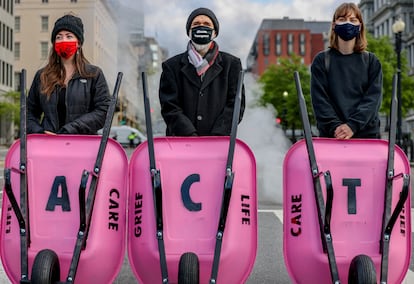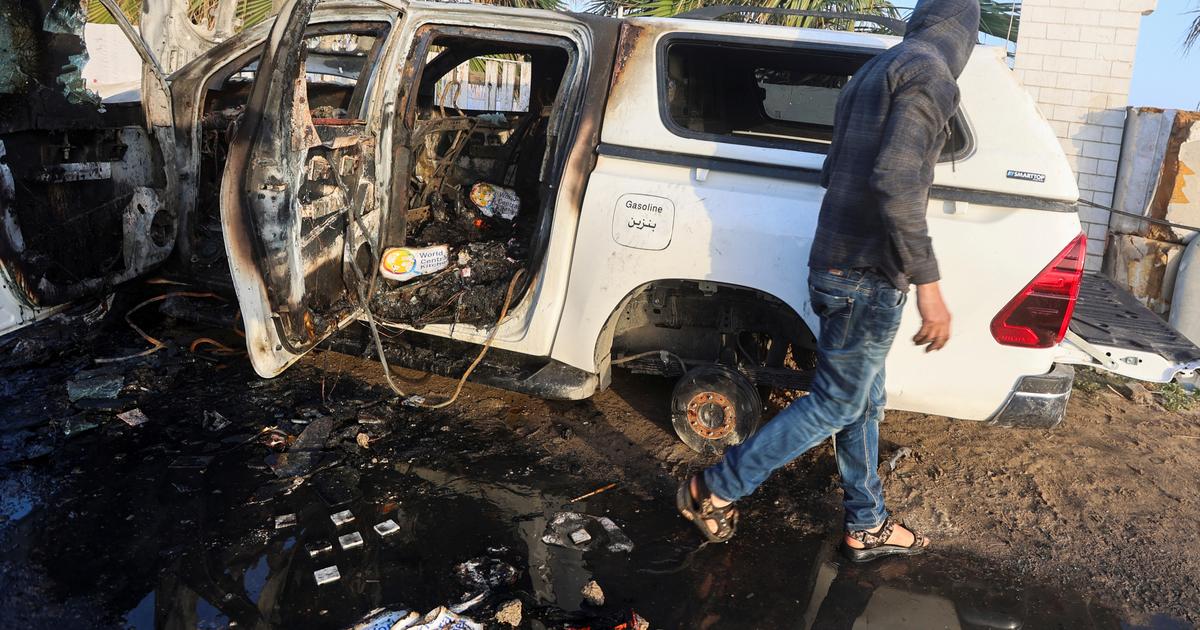Pablo Servigne (Versailles, 43 years old) has become one of the most listened to sinking theorists thanks to the repercussion of his latest books, in which the French scientist - from a Colombian mother, which explains his name, his complexion and his Almost perfect Spanish, which he perfected “de tapas por Oviedo” - predicts the convergence of different crises that could lead us towards an irreversible whirlpool. He does not say it, despite everything, with special drama. "When this is the case, it will be enough to be prepared," says Servigne, co-author with Raphaël Stevens of the recent essay
Collapsología
(Harp), who this Monday passed through Barcelona to deliver a lecture at the Escola Europea d'Humanitats, directed by Josep Ramoneda.
Servigne gave up his job as a researcher years ago, fed up with being locked in the ivory tower of his laboratory. This agronomist and PhD in Biology packed his bags and left the city with his partner and two children. “We wanted them to grow close to forests, squirrels and wild boars, and not between ambulances and garbage trucks. In this century it will be essential to connect again with the wild and also with the collective, leaving the anonymity of the cities. The more you climb the mountain, the more mutual help you see ”, he relates. The colder the winter gets, the more people come out to help their neighbors cut firewood. This reminded him of something he already knew, having specialized for seven years in the sociability of ants."Studying insects allowed me to break with that absurd ideology of generalized competition, with all that neoliberal rhetoric," he says.
"Studying insects allowed me to break with that absurd ideology of generalized competition"
Reading authors like Rob Hopkins made me want to participate in the public debate. He left his job in 2008 and began to write what he sensed: that, without an urgent and massive mobilization, the planet was on the way to perdition. A report for the European Parliament commissioned in 2013 by former environmental minister Yves Cochet, who has since become one of the main disseminators of his thesis, led him to come to this conclusion: the ecological, energy and climate collapse will occur before the end of his generation. “No one was aware of it except the scientists. To alter that situation, we created collapsology ”, he says about this new discipline, forged together with Stevens, a specialist in ecological transition and co-author of his essay, and Gauthier Chapelle, theorist of biomimicry,science that is inspired by nature to solve human problems. “The objective is to inform as clearly as possible the greatest number of people to prepare in the best way against the big clashes that are coming. The more we prepare, the less catastrophic they will be ”, he sums up.
Its mission is to reformulate postulates that, until not so long ago, were considered extremists, utopians or worthy of eccentrics and nuts.
“We have made them audible to the intellectual and urban classes.
We have brought them closer to all social groups and all economic sectors, political parties, religious groups and even the army ”, Servigne explains.
Despite the criticism that continues to rain on him for his apparent prophetism, the increasing severity of the climate crisis has caused these ultra-minority theses to infiltrate the global agenda.
“When the pandemic hit, I didn't feel scared.
I had been preparing for it for 15 years "
Awareness has occurred, according to Servigne, in three stages. The first was the alarm generated by the nuclear winter, at the same time that the Club of Rome was created in 1968, which already warned about the dangers of developmentalism and its unlimited growth. It resulted in the emergence of currents such as catastrophism and
survivalism
, which "was first from the extreme left and then from the extreme right."
The second took place during the last decade, with the canicular waves in Europe, the very pessimistic report on global warming by the IPCC - the group of scientists who advise the UN on climate change -, the appearance of groups such as Extinction Rebellion or the yellow vests in France and the “media monster” that became Greta Thunberg.
"That's when the third episode arrived: the pandemic," Servigne says.
He confirmed his worst forecasts.
“But when it happened, I didn't feel scared, because I've been preparing for it for 15 years.
It's like a duel: you have to wear out your emotions so as not to let yourself be carried away by them ”.
Ecologists from 'Extinction Rebellion' block the streets of Washington on April 22, Earth Day.EVELYN HOCKSTEIN / Reuters
In his view, it is in this shared mourning that we find ourselves today: in the traumatic process of saying goodbye to an idea of the future, to a blind faith in progress. “Getting rid of that imaginary is very painful, but I have already reached that point. I do not believe that my generation will receive a pension or that my children know about giraffes, "he says. It is not that the day is ashy; He says it with total detachment. “It is too late to speak of optimism or pessimism. When there is a fire, you just take action, ”says Servigne, who anticipates a future marked by detoxification with regard to substances that he considers harmful. "Like drug addicts, we must learn to stop drugs such as oil, wealth or GDP."
Another of its references, the geographer and anthropologist Jared Diamond, has written that all the civilizations that succumbed in the past, whether due to bloody wars, climatic catastrophes or commercial disasters, shared a common denominator: the terrible decisions that their leaders made to get out. of each of those crises.
“They live in a bubble of comfort that makes them convinced that the road will continue in a straight line.
Until they see themselves falling off the cliff, just like the Coyote chasing the Road Runner ”, smiles Servigne.
The date of the end of the world
The solution would pass, for the scientist, through experimentation with “small resilience systems” such as cooperatives and ecovillages, through a doctrine of
shock.
invested in which the gaps opened by each crisis are taken advantage of to formulate alternative solutions to capitalism.
The State seems to him an institution destined to disappear.
“It is too expensive.
It can sink because of an energy crisis, when oil begins to run low, and also because of the lack of confidence that inspires their common story.
If we stop believing in France or Europe, they will disappear ”.
It does not seem like a desirable twilight to him, despite his anarchist culture.
“It is a long-term aspiration, because the State is the product of 500 years of violent, capitalist and colonial history.
But, in the short term, it does not seem desirable to me.
The state has a monopoly on social cohesion.
Societies are not ready to live without it ”, he admits.
"I do not believe that my generation will receive a pension or that my children know giraffes"
Servigne is reluctant to give a date for the end of the world. “I am not an astrologer. You can't forecast the future scientifically, ”he protests kindly. What he does agree to share is one of his intuitions. “In 2030, the world will have totally changed. My feeling is that before that year there will be a social collapse, ”says Servigne, who includes in it the worrying resurgence of fascism in various parts of the planet. Still, he is not as apocalyptic as his words seem to indicate. He does not believe, for example, in that inevitable civil war that certain television series describe. “In the worst crises, solidarity has always re-emerged. Human nature is not evil. The problem is that we are governed by antisocial institutions that proclaim aggression and dismantle care ”, he says.“The only way to survive this century will be mutual aid. What's more, those who don't help others will be the first to die ”.



/cloudfront-eu-central-1.images.arcpublishing.com/prisa/AFLYZDTUIJETROGK67SU5F4OOA.jpg)





